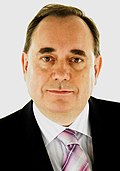Second Salmond government | |
|---|---|
| 6th government of Scotland | |
| 2011–2014 | |
 Salmond and his cabinet at Bute House, 2011 | |
| Date formed | 19 May 2011 |
| Date dissolved | 18 November 2014 |
| People and organisations | |
| Monarch | Elizabeth II |
| First Minister | Alex Salmond |
| First Minister's history | MSP for Banff and Buchan (1999–2001) MSP for Aberdeenshire East (2007–2016) |
| Deputy First Minister | Nicola Sturgeon |
| Member party | |
| Status in legislature | Majority |
| Opposition party | |
| Opposition leader | Iain Gray (2011) Johann Lamont (2011-14) Jackie Baillie (2014) |
| History | |
| Election | 2011 general election |
| Legislature term | 4th Scottish Parliament |
| Budgets | 2012 Scottish budget 2013 Scottish budget 2014 Scottish budget |
| Predecessor | First Salmond government |
| Successor | First Sturgeon government |
Alex Salmond formed the second Salmond government on 19 May 2011 following his Scottish National Party's landslide victory in the 2011 election to the 4th Scottish Parliament. This was the first single-party majority government in the history of the devolved parliament. Salmond's second government ended on 18 November 2014 upon his resignation as First Minister of Scotland.












